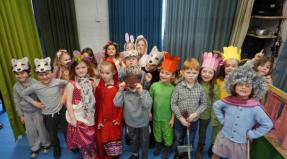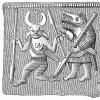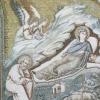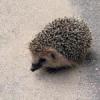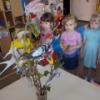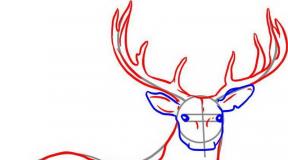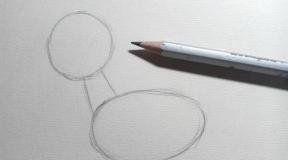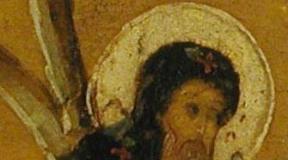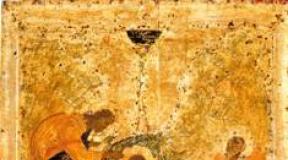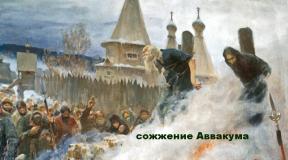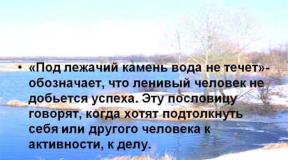A bedtime story for children about a bird. Selected stories about birds for children. Speech exercise "Name affectionately"

 There lived a hedgehog and a bird, they were friends from early childhood, helped each other on the hunt and helped out of trouble.
There lived a hedgehog and a bird, they were friends from early childhood, helped each other on the hunt and helped out of trouble.
A bird, sitting high on a tree, could see a lot of interesting things, and when it saw a mouse or a beetle, it spoke to the hedgehog, and he caught it, because the hedgehog is a predator and it feeds not only on apples and mushrooms, but on mice and beetles.
And the hedgehog helped the bird to look for berries and nuts, running on the ground, he could see everything better and his scent is better than that of birds.
They were friends when they grew up and started their own families. But then trouble came to the bird's house. While she and her husband flew to get food for their chicks, a snake climbed into their nest for good and attacked the cubs, when the bird returned, she caught a snake there, began to peck at it and protect its babies and the snake had to retreat, she crawled away under a tree and began to watch when the bird flies off to hunt or falls asleep. The bird was horrified - how to protect the kids, what to do? She decided to seek help from a friend hedgehog, but he sleeps during the day and walks at night. The bird began to wait for the night. When the hedgehog woke up, he came to his girlfriend and found there a sad picture - a frightened girlfriend and chicks crying from hunger, and the snake, smelling the hedgehog, crawled away in its own way. The hedgehog sent the bird for food, and he himself stayed on guard in case the snake returned, while he was waiting for the bird, he came up with an ingenious plan to catch the snake.
When the bird arrived, the hedgehog called her to hunt for the snake as an assistant. The hedgehog with his sensitive scent followed the trail of the snake, like a dog, and found a snake hole. He and the bird created a trap from the branches so that the sutra snake, when it crawls out of the hole, will fall into it. And so it happened, early in the morning the snake fell into the cunning trap of the hedgehog, he pulled out the robber, lit a fire and threw the snake into the fire. He saved chicks and many other animals from predatory snake fangs. And they began to live well and make good.
N. Sladkov "Polite Jackdaw"
I have many friends among the wild birds. I know one sparrow. He is all white - albino. You can immediately distinguish him in a flock of sparrows: all are gray, and he is white.
I know forty. I distinguish this one by impudence. In winter, people used to hang food outside the window, so she would fly in right now and ruffle everything.
But one daw I noticed for her politeness.
There was a blizzard.
In early spring, there are special blizzards - sunny. Snow whirlwinds swirl in the air, everything sparkles and rushes! Stone houses are like rocks. Above there is a blizzard, from the roofs, like from the mountains, snow falls. Icicles from the wind grow in different directions, like the shaggy beard of Santa Claus.
And above the cornice, under the roof, there is a secluded spot. There, two bricks fell out of the wall. In this recess my jackdaw settled down. All black, only a gray collar on the neck. Jackdaw basked in the sun, and even pecked some tidbit. Cubby!
If this jackdaw were me, I would not concede such a place to anyone!
And suddenly I see - another, smaller and dimmer in color, flies up to my big jackdaw. Jump-jump along the cornice. Twist and twist your tail! She sat down opposite my jackdaw and looked.
The wind flutters her - so it breaks feathers, so it whips with white grain!
My jackdaw grabbed a piece of its own in its beak - and go from the recess to the cornice! A warm place was lost to a stranger!
And someone else's jackdaw grab a piece from my beak - and on its warm place. She pressed someone else's piece with her paw - it bites. Here is shameless!
My jackdaw on the ledge - in the snow, in the wind, no food. The snow cuts it down, the wind breaks its feathers. And she, stupid, suffers! Doesn't kick out the little one.
“Probably,” I think, “someone else’s jackdaw is very old, so they give way to it. Or maybe it's a well-known and respected jackdaw? Or maybe she is small, but remote - a brawler. " I didn’t understand anything then ...
And recently I see: both jackdaws - mine and someone else's - are sitting side by side on an old chimney and both have twigs in their beaks.
Hey, they are building a nest! Here everyone will understand.
And the little jackdaw is not at all old and not a brawler. And she is not a stranger now. And, of course, not respected by everyone.
And my friend a big jackdaw is not a jackdaw at all, but a gal!
But still my friend gal is very polite. This is the first time I've seen such a person.
M. Prishvin "Guys and Ducklings"
The little wild duck teal-whistle finally decided to transfer her ducklings from the forest, bypassing the village, into the lake to freedom. In the spring, this lake overflowed far away, and a solid place for a nest could be found only three miles away, on a hummock in a swampy forest. And when the water subsided, I had to travel all three miles to the lake.
In places open to the eyes of a man, a fox and a hawk, the mother walked behind so as not to let the ducklings out of sight for a moment. And near the smithy, when crossing the road, she, of course, let them go ahead. Here the guys saw them and threw their hats. All the time, while they were catching ducklings, the mother ran after them with an open beak or flew in different directions for several steps in the greatest excitement. The guys were just about to throw their hats over their mother and catch her like ducklings, but then I approached.
- What will you do with the ducklings? - I asked the guys sternly.
They chickened out and replied:
- Let's go.
- Let's just let it go! I said very angrily. - Why did you have to catch them? Where is mother now?
- And there is sitting! - the guys answered in unison.
And they pointed me to a nearby mound of a fallow field, where the duck really sat with his mouth open from excitement.
- Alive, - I ordered the guys, - go and return all the ducklings to her!
They even seemed to be delighted at my order and ran with the ducklings up the hill. The mother flew off a little and when the guys left, she rushed to save her sons and daughters. In her own way, she quickly said something to them and ran to the oat field. Ducklings ran after her - five of them. And so along the oat field, bypassing the village, the family continued their journey to the lake.
I happily took off my hat and, waving it, shouted:
- Happy journey, ducklings!
The guys laughed at me.
- What are you laughing at, silly fools? - I said to the guys. - Do you think it's so easy for ducklings to get into the lake? Take off all your hats quickly, shout "goodbye"!
And the same hats, dusty on the road while catching ducklings, rose into the air; all at once the guys shouted:
- Goodbye, ducklings!
M. Prishvin "Zhurka"
Once we had it - we caught a young crane and gave him a frog. He swallowed it. Gave another - swallowed. The third, fourth, fifth, and then there were no more frogs at hand.
- Clever girl! - said my wife and asked me:
- And how many of them can he eat? Ten maybe?
“Ten,” I say, “maybe.
- And if twenty?
- Twenty, - I say, - hardly ...
We clipped the wings of this crane, and he began to follow his wife everywhere. She milks a cow - and Zhurka is with her, she is in the garden - and Zhurka needs to be there, and she also goes to field work on collective farm work with her, and fetch water. The wife got used to him, as to her own child, and without him she is really bored, without him nowhere. But only if it happens - he is not, he will shout only one thing: "Fru-frou", and he runs to her. Such a clever girl!
This is how the crane lives with us, and its clipped wings keep growing and growing.
Once my wife went to fetch water down to the swamp, and Zhurka followed her. A small frog sat by the well and jumped from Zhurka into the swamp. The beetle is behind him, and the water is deep, and you can't reach the frog from the shore. Mah-flap Zhurka's wings and suddenly flew. The wife gasped - and after him. Swing his arms, but he cannot get up. And in tears, and to us: “Oh, oh, what a woe! Ahah!" We all ran to the well. We see - Zhurka is far away, in the middle of our swamp sits.
- Fru-frou! I shout.
And all the guys behind me are also shouting: "Fru-fru!"
And so clever! As soon as he heard this our "fruit-fruit", now he flapped his wings and flew in. At this point, the wife does not remember herself for joy, she tells the guys to run after the frogs as soon as possible. This year there were a lot of frogs, the guys soon gathered two caps. The guys brought the frogs, began to give and count. Given five - swallowed, given ten - swallowed, twenty and thirty ... Yes, and so it swallowed forty-three frogs at a time.
L. Voronkova "Swans and Geese"
Suddenly grandfather stopped digging, tilted his head to one side and listened to something.
Tanya asked in a whisper:
- What is there?
- Do you hear - the swans are trumpeting?
Tanya looked at her grandfather, then at the sky, then again at her grandfather and smiled:
- Well, do the swans have a pipe?
- What a pipe there! - the grandfather laughed. - They just shout so long, so they say that they are trumpeting. Well, do you hear?
Tanya listened. Indeed, somewhere high-high, distant drawn-out voices were heard.
“You see, they’re flying home from across the sea,” said grandfather. - How they echo. No wonder they are called whoopers. And over there, they flew past the sun, they became visible ... See?
- See see! - Tanya was delighted. - They fly like a rope. Maybe they'll sit down here somewhere?
- No, they won't sit here, - said grandfather thoughtfully, - they flew home!
- How - home? - Tanya was surprised. - And we have something not a house?
“Well, it’s not a home for them.
Tanya was offended:
- Swallows - a home, larks - a home, starlings - a home ... And they are not a home?
- And their house is closer to the north. There, they say, there are many swamps and lakes in the tundra. There they nest, where it is quieter, where there is more water.
- And we don't have enough water for them? There is a river, there is a pond ... After all, it’s better with us anyway!
- Whoever was born where, he came in handy there, - said the grandfather. - Each region is better.
At this time the geese left the yard, stopped in the middle of the street, raised their heads and fell silent.
- Look, grandfather, - Tanya whispered, tugging at his sleeve, - and our geese also listen to swans! No matter how they flew to the tundra!
- Why should they! - said the grandfather. - Our geese are heavy on the rise! - And again he began to dig the ground.
Swans fell silent in the sky, disappeared, melted into the distant blue. And the geese lagged, creaked and waddled down the street. And the goose tracks were clearly imprinted in triangles on the damp road.
V. Veresaev "Brother"
At the corner of my dacha stood a tub full of water. Nearby is an elderberry bush. Two young sparrows were sitting side by side on an elderberry, still very young, with a downy fluff coming through from behind the feathers, with bright yellow sinuses along the edges of their beaks. One briskly and confidently fluttered to the edge of the tub and began to drink. He drank - and kept looking at the other and echoing with him in his ringing tongue. Another - a little smaller - with a serious look was sitting on a branch and cautiously squinting at the tub. And, apparently, he was thirsty - the beak was open from the heat.
And suddenly I saw clearly: the one, the first, he had already drunk for a long time and simply by his example encourages the other, shows that there is nothing terrible here. He continuously jumped along the edge of the tub, lowered his beak, grabbed water and immediately dropped it from his beak, and looked at his brother - he called him. The brother on the branch made up his mind, flew to the tub. But he just touched the damp, green edge with his paws - and immediately, frightened, he fluttered back onto the elderberry. And he again began to call him.
And finally got it. The little brother flew over to the tub, sat uncertainly, flapping his wings all the time, and got drunk. Both flew away.
V. Bianchi "Foundling"
The boys ravaged the heater's nest, broke its testicles. Naked, blind chicks fell out of the broken shells.
Only one of the six testicles I managed to take from the boys intact.
I decided to save the chick hidden in it.
But how to do that?
Who will bring him out of the egg?
Who will feed?
I knew the nest of another bird nearby - the mocking warblers. She just laid her fourth testicle.
But will a foundling's mockery accept? The egg of the heater is pure blue. It is more and not at all like mocking testicles: those are pink with black dots. And what will happen to the chick of the heater? After all, he is about to come out of the egg, and the little laughs will hatch only after another twelve days.
Will a mocking laugh feed a foundling?
The mocking nest was placed so low on the birch that I could reach it with my hand.
When I approached the birch, the laugh flew from the nest. She fluttered along the branches of neighboring trees and whistled plaintively, as if begging not to touch her nests.
I put a blue egg next to her crimson ones, walked away and hid behind a bush.
The mockery did not return to the nest for a long time. And when, at last, she flew up, she did not immediately sit in it: it was obvious that she was looking at someone else's blue egg with disbelief.
But all the same, she sat in the nest. So she took someone else's egg. The foundling became a fake.
But what will happen tomorrow when the little stove is hatched from the egg?
When in the morning the next day I approached a birch, a nose protruded from one side of the nest, and a mocking tail on the other.
When she flew off, I looked into the nest. There were four pink testicles and next to them was a naked, blind chick of the heater.
I hid and soon saw how a mocking laugh flew in with a caterpillar in its beak and put it in the mouth of a small stove.
Now I was almost certain that the mocking laugh would feed my foundling.
Six days have passed. Every day I approached the nest and every time I saw the beak and tail of a mocking laugh sticking out of the nest.
I was very surprised how she keeps up with feeding the stove and hatching her eggs.
I quickly walked away so as not to interfere with her in this important matter.
On the seventh day, neither the beak nor the tail protruded above the nest.
I thought, “It's over! The chuckle left the nest. The little stove died of hunger. "
But no, there was a live heater in the nest. She was asleep and did not even pull her head up, did not open her mouth: it meant she was full.
She had grown so much these days that she covered with her little body the pink testicles that were barely visible from under her.
Then I guessed that the reception thanked his new mother: with the warmth of his little body, he warmed her testicles - incubating her chicks.
And so it was.
Mocking fed the foster, the foster incubated her chicks.
It grew and flew out of the nest before my eyes.
And just by this time, chicks hatched from pink testicles.
Mocking began to feed her native chicks and fed them to glory.
Issues for discussion
About whom is N. Sladkov's story "The Polite Jackdaw"?
Why did the jackdaw give up its warm place to another bird?
Listen to M. Prishvin's story "Guys and Ducklings." Can we call this work a fairy tale? Why? (There are no fairy-tale characters and no miracles occur.) Can we say that this is a poem? (No, it lacks melody, melodiousness, the endings of words in the lines do not rhyme, it does not differ in imagery.) Who is this story about? Why did the teal whistle duck end up on the road? Where did she go with the ducklings? Why do you think the guys started catching ducklings? How did the duck behave at this time? (She ran after them with open beak or flew in different directions in the greatest excitement.) Why was she so worried? Who saved the ducklings? What did the duck do when the ducklings were returned to her? How did the story end? What did the author teach you?
About whom is M. Prishvin's story "Zhurka"? Why is it called that? How did a young crane get to people? Could he fly when his wings were clipped? What did he start to do? How did the hunter's wife call him to her? Tell us what happened when a crane grew its clipped wings. How did the story end? Who did you like in the story? Why?
What do you know about swans? What kind of birds are they? Where do they live? What kind of geese are there? Do swans fly away for the winter? When do they get home? Do domestic geese fly south? Listen to how L. Voronkova tells about domestic geese and about the swans returning from across the sea to their homes. What can you say about how the swans cry? Why does Grandpa compare their screaming to the sound of a trumpet? So what are the swans doing? (They shout, trumpet, call out.) What else are swans called? Where do the swans fly? Why? Can geese fly to the tundra?
About whom is V. Veresaev's story "Brother"? What were the sparrows? (Young, small, with fluff visible through the feathers.) Were they similar or different? Which sparrow do you like best? Why? What was the first sparrow? (Brave, courageous, lively, self-confident.) And what was the second sparrow? (Timid, fearful, cowardly, timid, cautious.) Tell me how a sparrow called his brother to drink water.
He then calmed down, and then you could go outside and breathe a little fresh autumn air, or else it would disperse again, and then you no longer wanted to go anywhere.
The hedgehog has been at home for a whole week. He looked out the window at the gray clouds that covered the sky, looked at the streams of rain flowing down from the tree under which his house was located. I didn't want to go outside at all, but I wanted a little warmth and light, which seemed to be gone until next spring.
One autumn evening, the Hedgehog, having sipped tea with dried currants, went to bed. I always slept well under the measured sound of rain. The hedgehog quickly fell asleep and he had a wonderful dream about how summer had come, and he walks through the forest and listens to the singing of birds, and butterflies and dragonflies are circling around, flowers are blooming. In the morning the Hedgehog woke up with a happy smile on his face. He lay on the bed for a long time and it seemed to him that the dream was going on. The hedgehog fancied that the sun was shining brightly and the birds were singing. Finally, the Hedgehog woke up completely and noticed that a bright sunlight was falling through the window into the room. The hedgehog even felt his warmth. Not believing his eyes, the Hedgehog jumped out of bed and ran to the window. Opening the window, he saw in the sky a bright and warm sun that was not in the autumn. It illuminated the forest with its radiance, and the trees, imitating it, sparkled with golden leaves.
- What a beauty, - the Hedgehog whispered admiringly.
And then the Hedgehog thought that he even hears the singing of birds. He sat down by the windowsill and, resting his head on his paws, closed his eyes. The singing was overflowing with different voices and was so beautiful that the Hedgehog broke into a smile again. Suddenly the Hedgehog realized that he was not dreaming of singing and, indeed, a bird was singing somewhere. The hedgehog could not explain how this could have happened, because all the songbirds had already flown south a long time ago. He became very curious and quickly ran out into the street.
It was light and warm outside. The bright sun warmed the earth. There was no wind. There was a pleasant autumnal scent of fallen leaves in the air. The sunbeams were playing in the crowns of the trees, and on the lower branch of the spruce a bird was sitting and singing. The hedgehog has never seen such birds. She was very unusual: her feathers were cast in a rainbow and gilding, her long tail was divided into two parts, her wings were blue, and a bright red bow was burning on her chest. The bird sang, lifting its head to the sun. On her head was a rainbow crest. The ball bird is beautiful and sang amazingly too. Her singing reminded the Hedgehog of all the summer birds that had flown away to the south long ago.
Noticing the Hedgehog, the bird paused for a second and was alert, but seeing an enthusiastic look, she immediately continued. The hedgehog sat on the grass and listened, smiling. It seemed to him that he was sleeping or was in a fairy tale, where summer is all year round. Soon a cool breeze blew, and the bird stopped singing. She looked up at the sky and spread her wings to fly.
- Wait, - the Hedgehog shouted, - don't fly away.
The bird looked at the Hedgehog and smiled:
“I have to hurry,” she answered in a ringing voice, “it will soon be quite cold.
- Do you want me to give you tea and you will warm up? - Hedgehog suggested.
- Thank you, but I'm in a hurry.
The hedgehog did not want to part with the unexpected miracle, but he understood that the bird really had no time.
- Tell me, who are you? Why have I never seen you before? - asked the Hedgehog, running closer.
“Because,” the bird replied, “I never stop here. In the summer I live in the north, and in the winter I fly to the south. Today, when I flew past the spruce and saw the sunrise, I so wanted to stop for a while and sing a song, even if no one hears it.
- I heard your song, - the Hedgehog shouted joyfully, - I really liked it!
“Thank you too,” the bird shouted, taking off.
She quickly flew up and flew over the forest. The hedgehog stood for a long time and looked after her. Soon the sky was clouded again, and a light rain began to fall. The hedgehog went home. He sat at the window and thought about a strange miracle, about a bird that flew to distant lands and, stopping for a while, returned summer. The bird flew away, taking good weather with it, but she left part of her song in the Hedgehog's soul, which made him warm and joyful.
KD Ushinsky "Someone else's testicle"
Early in the morning, old woman Daria got up, chose a dark, secluded place in the chicken coop, put a basket there, where thirteen eggs were laid out on soft hay, and sat the crested hen on them. It was a little light, and the old woman did not consider that the thirteenth testicle was greenish and smaller than the others. The hen sits diligently, warms the testicles; she runs off to nibble on the grains, drink some water - and back into place: she even faded, poor thing. And how angry she became: he hisses, clucks, even the cockerel does not allow him to come, but he really wanted to look into what was going on there in a dark corner. The hen sat for about three weeks, and began to hatch from the eggs of the chick one after the other: he will bite the shell with his nose, jump out, shake himself off and begin to run, rake dust with his legs, look for worms.
The chick from a greenish testicle hatched later than everyone else. And what a strange he came out, round, fluffy, yellow, with short legs, with a wide nose. “A strange chicken came out for me,” the hen thinks, “and it bites, and it doesn’t walk in our way; the nose is wide, the legs are short, some kind of clubfoot, waddles from foot to foot. " The chicken marveled at her chicken, however, no one is, and everything is a son. And he loves and protects him, as well as others, and if he sees a hawk, then, fluffing feathers and spreading wide round wings, hides his chickens under him, not making out which legs.
The hen began to teach the children how to dig worms out of the earth, and took her whole family to the shore of the pond: there are more worms there and the earth is softer. As soon as the short-legged chick saw the water, he rushed straight into it. The chicken screams, flaps its wings, rushes to the water; the chickens are also worried: they run, fuss, squeak; and one cockerel in fright even jumped on a pebble, stretched out his neck and for the first time in his life yelled in a hoarse voice: "Ku-ku-re-ku!" Help, they say, good people, brother is drowning! But my brother did not drown, but happily and easily, like a piece of cotton paper, swam on the water, raking the water with his wide, webbed legs. At the cry of the chicken, old Daria ran out of the hut, saw what was happening, and shouted: “Ahti, what a sin! Apparently, I blindly put a duck egg under the chicken. "
And the hen was eager to go to the pond: they could drive the poor one away by force.
Listen to the story of KD Ushinsky "Someone else's testicle". Were all the testicles on which the hen was sitting were the same? What was the greenish egg chicken? How was he different from other chickens? What did this weird chick do when he saw the pond? Why did the chicken start screaming, rushing to the pond? Who is this strange chicken? Who did you like the most in the story?
KD Ushinsky "Cockerel with a family"
A cockerel walks around the yard: there is a red comb on his head, a red beard under his nose. Petya's nose is a chisel, Petya's tail is a wheel; there are patterns on the tail, spurs on the legs. Petya rakes a bunch of paws with his paws, calls the chickens with chickens: “Crested hens! Troubled hostesses! Motley, speckled! Little black and white! Get together with the chickens, with the little children: I have a grain in store for you! "
Chickens with chickens gathered, cackled; they didn't share a grain - they fought.
Petya the cockerel does not like riots - now he has reconciled his family: that one for the crest, the other for the whirlwind, he ate the grain himself, flew up the fence, flapped his wings, yelled at the top of his throat ku-ka-re-ku!
Questions for discussion with children
How does KD Ushinsky describe the cockerel in his story "Cockerel with a Family"? What is his comb, what beard, what nose, what tail? What's on the tail of the cock? What patterns on the tail can a rooster have? What's on the rooster's legs? How does a cock call his family together? How does a cockerel clean up his family? Did you like the cockerel? Draw it. What will the cockerel have the brightest, most beautiful?
M. Zoshchenko "Smart Bird"
One boy was walking in the forest and found a nest. And in the nest there were tiny naked chicks. And they squeaked.
They were probably waiting for their mother to arrive and feed them with worms and flies.
Here the boy was glad that he had found such nice chicks, and wanted to take one to bring him home.
As soon as he stretched out his hand to the chicks, suddenly from the tree, like a stone, a feathery bird fell at his feet.
She fell and lies in the grass.
The boy wanted to grab this bird, but it jumped a little, jumped on the ground and ran to the side.
Then the boy ran after her. “Probably,” he thinks, “this bird has hurt its wing, and therefore it cannot fly.”
Only the boy approached this bird, and she again jumped, jumped on the ground and again ran away a little.
The boy followed her again. The bird flew up a little and sat down in the grass again.
Then the boy took off his hat and wanted to cover the bird with this hat.
As soon as he ran up to her, she suddenly fluttered and flew away.
The boy was directly angry with this bird. And he went back as soon as possible to take at least one chick for himself.
And suddenly the boy sees that he has lost the place where the nest was, and cannot find it in any way.
Then the boy realized that this bird had deliberately fallen from the tree and was running on the ground on purpose in order to take the boy away from its nest.
Questions for discussion with children
What kind of birds do you know? Where do birds build their nests? Why?
Did you like the story of M. Zoshchenko? What is it called? Who did you like best in the story - a boy or a bird? Why? Tell me how the boy found a nest on the ground. Why was he happy? How did the bird manage to save its chicks?
I. S. Turgenev "Sparrow"
I was returning from hunting and walking along the alley of the garden. The dog ran ahead of me.
Suddenly she reduced her steps and began to sneak; as if sensing the game in front of him.
I looked along the alley and saw a young sparrow with yellowness near its beak and down on its head. He fell out of the nest (the wind strongly swayed the birches of the alley) and sat motionless, helplessly spreading out his barely growing wings.
My dog slowly approached him, when suddenly, having fallen from a nearby tree, the old black-chested sparrow fell like a stone in front of her muzzle - and all disheveled, distorted, with a desperate and pitiful squeak, jumped once or twice in the direction of the toothy, open mouth.
He rushed to save, he covered his brainchild with himself ... but his whole little body trembled with horror, his voice went wild and hoarse, he died away, he sacrificed himself!
What a huge monster the dog must have seemed to him! And yet he could not sit on his high, safe branch ... A force stronger than his will threw him out of there.
My Trezor stopped, backed away ... Apparently, and he recognized this power.
I hastened to recall the embarrassed dog and left, reverent.
Yes, don't laugh. I was in awe of that little, heroic bird, of her love impulse.
Love, I thought, is stronger than death and the fear of death. Only by her, only by love does life hold and move.
Issues for discussion
Listen to the story of I. S. Turgenev "Sparrow". Who is this story about? Whom did the dog see? Tell me what the sparrow was. Was it an old or young sparrow? What happened to him?
What did the dog do when it smelled a sparrow? Who saved the little sparrow from the big dog? What did the old sparrow do? Was he scared? Why did he rush to protect his cub? How did the story end? Who did you like the most in the story? Why?
KD Ushinsky "Swallow"
The ornamental swallow did not know rest, flew day after day, dragged straws, sculpted them with clay, forged a nest. She made a nest for herself: she carried testicles. Has inflicted testicles: it does not come off the testicles, it is waiting for the children. I hatched the kids: the kids squeak, they want to eat. The ornamental swallow flies day or day, does not know at rest: it catches midges, feeds the crumbs.
The inevitable time will come, the children will fledge, all will fly apart, over the blue seas, over the dark forests, over the high mountains. The ornamental swallow does not know rest: day after day it prowls around - looking for cute children.
Issues for discussion
Listen to the story of KD Ushinsky "Swallow". Why does the swallow fly day after day, does not know rest? What did the swallow do? What is the name of the swallow in the story? How do you understand the words: "The time will come, the chicks will fledge ..."?
N. Romanova "Clever crow"
When I walk down the street now, I look closely at the birds that are sitting on fences or running along the paths. Therefore, I immediately noticed the crow, which I will tell you about now. She was unusual. Crows are generally different from other birds. They are like "scientists" among them. The head is large, the beak is important. And they walk, and do not jump like sparrows.
The raven, which I noticed, seemed to me to have a damaged wing. And suddenly I see a cat coming out of the basement. The cat has cunning eyes, she sees everything, understands everything.
Now, I think, and I will see how birds with cats in the wild live.
Here, next to the cat, sparrows jump, but the cat does not pay attention to them. Of course, after all, this cat is a yard cat, she is not like my Kotka - she won’t chase birds in vain. She knows that no matter how many birds are jumping nearby, it is still very difficult to catch them.
Another thing is a crow with a black wing. You can catch this crow. I looked, the cat fell to the ground and began to sneak. Only a crow sees a cat too, and this is what she came up with: the crow is coming straight to me, they say, protect me, don't let the cat be offended, drive the cat away. Then the cat realized that I would not let her catch the crow, stopped sneaking and pretended that she didn’t need a crow at all.
Apparently, all cats know how to let indifference on themselves! After all, my Kotka made exactly the same indifferent look when he wanted me to leave him alone with Kenar Vanechka.
And the crow began to climb the tree. Jump, jump, a sick wing interferes, but quietly, calmly higher and higher ... climbed a tree, settled comfortably among the branches and sits there, dozing. In a dream, all diseases disappear. Maybe the crow, when it wakes up, will already be healthy.
Issues for discussion
What does a crow look like? What color is it? What does the crow eat? How does a crow cry? Where can you most often find a crow: in the city or in the forest?
Did you like the story of N. Romanova "The Clever Crow"? Who is this story about? How do crows differ from other birds? What was unusual about this raven? Who wanted to catch a crow with a black wing? How did the cat behave when it saw the crow? What did the crow come up with to save herself from the cat? Who did you like in this story: a cat or a crow?
V. Bianchi "The Rooks Opened Spring"
Large flocks of rooks appeared everywhere in the villages. Rooks spent the winter in the south of our country. They were in a hurry to our north - to their homeland. On the way, they more than once fell into cruel blizzards. Dozens, hundreds of birds were exhausted and died on the way.
The strongest flew first. Now they are resting. They pacing importantly along the roads and picking the ground with their strong noses ...
Issues for discussion
What birds fly to our area in the very first spring? Where do they spend the winter? Listen to V. Bianchi's story about rooks. What happened to the rooks on the way? Which rooks flew first? What are they doing now? What are the rooks looking for in the ground?
And Ra heard her voice. He sent Heavenly Power to punish the vulture that killed the cat's children. The Heavenly Force set out and sought Retribution. Retribution sat under the tree where the kite's nest was. And the Heavenly Power transmitted to Retribution the command of Ra to punish the kite for what he did with the children of the cat.
The birds yielded to the kestrel's requests, and she hurried to the aid of the wounded man. Here, they say, why the wurumacheri does not quarrel with the kestrel, but runs away from her, although the kestrel is a small bird: he remembers that he owes her life. And the takatra, who attacked and wounded him, he hates and does not miss the opportunity to harm her.
The whole day the chicken and her friends were looking for a needle and did not find it. The chicken rummaged in the ground, looked under every blade of grass - the needle was gone and that's it. Papango came and in terrible anger began to demand some other thing in order to compensate for the loss. But the chicken, which was used to collecting, did not want to give anything to him.
The son of the wind has turned into a bird, he no longer walks like a man, but flies. He lives in a cave, in a mountain, comes out from there and flies everywhere, and then comes back. He sleeps in a cave, and wakes up early in the morning and flies away again in search of food, then returns to the cave and sleeps there.
In the morning, Gnerru and her husband went out again in search of food. The husband was digging up the larvae - he was at the bottom, in the hole, and Gnerru was at the top. He put the maggots in the sack that Gnerra was holding. She shook the bag, and he dug more and more and put it on top. Then he went to another place and again found the larvae, he dug them up and put them in the bag too. And now the bag was already full to the top.
And at this time, the King of the Snakes kidnapped the daughter of the king of Angola. In search of her, her father sent his troops throughout the country, to all the forests and fields. The king of Angola was so desperate that he forbade singing, dancing and having fun in his kingdom until his daughter was found.
In ancient times, the Indians of the Miami tribe found an Indian girl who was almost dying of hunger in the forest. They took her to the leader, and he left her in his family. The years passed. The girl grew up and turned into a slender beauty. The Indians called her Sun Flower. She knew how to manage a canoe better than her peers, ran faster than anyone else and could swim long distances without much effort. But at the same time she was excessively proud.
After the deer gathered at the council of fish and reptiles. They have accumulated a lot of grievances against people, and they decided to send people unkind dreams. Let these dreams, like snakes, wrap around a person and strangle. Or they will send dreams about raw and rotten fish to discourage people's appetite and starve to death.
